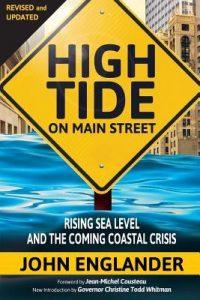What a climate-proof town looks like
Houston and Tampa should raise the question:
Is my town any more climate-proof?
 Media coverage of Houston and Florida is a bad disaster movie, with no happy ending. If you’re smart you’re asking “Could that movie be set in my neighborhood?” Here are three resources to help you find out.
Media coverage of Houston and Florida is a bad disaster movie, with no happy ending. If you’re smart you’re asking “Could that movie be set in my neighborhood?” Here are three resources to help you find out.
Oceanographer John Englander has studied the financial risks from increasingly severe storms and long-term sea level rise. His book, High Tide on Main Street, is a great place to learn their impact on infrastructure, real estate prices, and the economy. In addition, he discusses our tough choices ahead. Do we try to make ours a climate-proof town, or do we retreat to another locality? What would make intelligent adaptation possible? Will there be new technical safeguards? Will communities find the political will to make serious investments?
 My own book is another broader resource on defending our wallets against storms, sea-level rise and increased flooding, plus other costly threats from climate change. It’s a collection of 100+ actions, decisions, and attitudes that Americans are taking to deal with the impacts of climate change. Focusing on impacts to our assets, earnings, lifestyle, and community, some of the stories in the book have been updated in this blog. And the book contains scores of other ideas that may work for you, your family, or your neighborhood in creating a climate-proof town.
My own book is another broader resource on defending our wallets against storms, sea-level rise and increased flooding, plus other costly threats from climate change. It’s a collection of 100+ actions, decisions, and attitudes that Americans are taking to deal with the impacts of climate change. Focusing on impacts to our assets, earnings, lifestyle, and community, some of the stories in the book have been updated in this blog. And the book contains scores of other ideas that may work for you, your family, or your neighborhood in creating a climate-proof town.
Thirdly, if you’re thinking about life after an Irma or Harvey – or a big river flood, intense drought, or uncontrolled wildfire, all of which are becoming more expensive and dangerous over time – you may want to consider moving. There’s many a climate-proof town throughout American, some very well-protected indeed. Our Where-To-Live Scorecards tell which they are and why, based on many indicators that influence the exposure of a town’s residents to financial climate risks.
Remember what Rahm Emanuel says. “You never let a serious crisis go to waste. . . it’s an opportunity to do things you think you could not do before.” Like maybe assess the climate risks to your own bank account and take steps to protect it!

